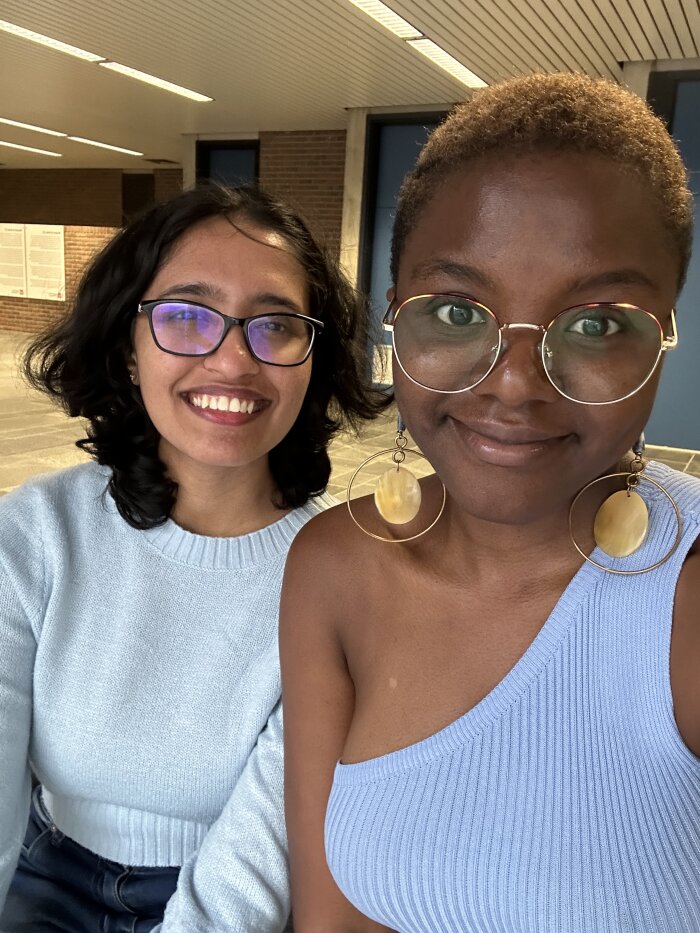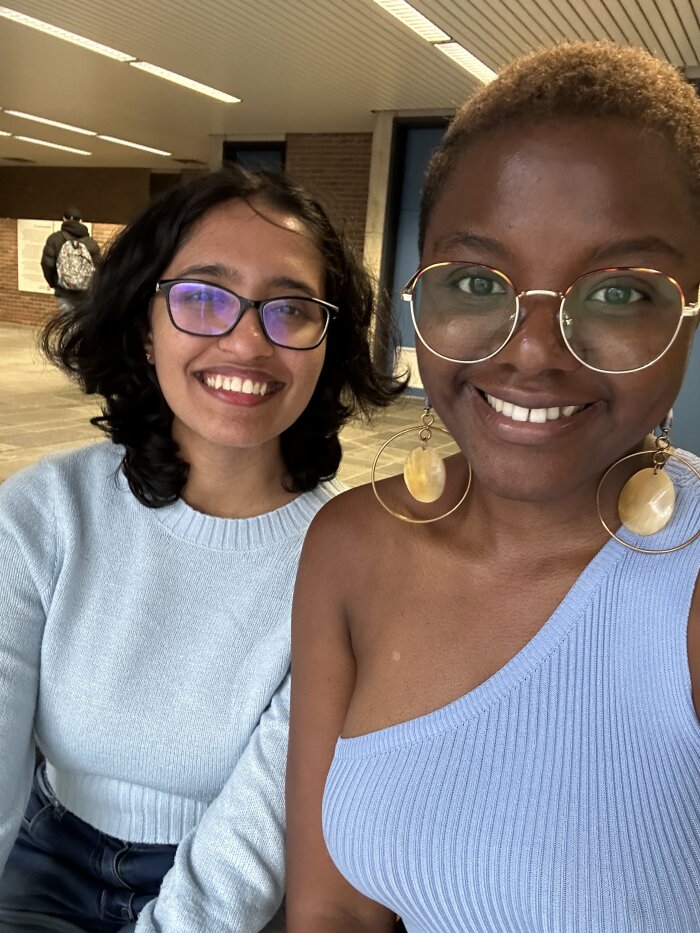Through initiatives like the Global Pen Friends project, students can bridge geographical and cultural divides, fostering empathy, mutual respect, and lasting friendships across borders.
Together with Ananya and Nabami, we want to tell the story of their USOS Global Pen Friends journey, and its role in shaping their cross-cultural understanding and personal growth.
As we explore their time at the University of Antwerp, we see how the friendships formed in the Global Pen Friends project have enriched their experience as an international student, showcasing the transformative impact of global connections.
-
 Een verhaal van Global Pen Friends
Een verhaal van Global Pen Friends -
 Een verhaal van Global Pen Friends
Een verhaal van Global Pen Friends
Back when you started exchanging letters in 2021 as “Pen Friends”, how did this connection impact you? What insights did you gain from each other, and the diverse international perspectives shared during that time?
Nabami: Initially, it was an honor to connect with Ananya, a young student from the other side of the world. Despite the spatial and temporal differences, we found correlations between our cultures. While Congolese and Indian cultures are fundamentally different, we discovered shared values and experiences. Choosing our theme of discussion during thisGlobal Pen Friends exchange directly linked us, leading us to confront the evidence that gender-based discrimination remains prevalent in today's society. This exchange impacted me by allowing me to discover and learn more about Indian culture and draw parallels with my own (the Congolese culture). Our discussions changed my perspective on feminism, realizing it's not solely the domain of experts but a collective responsibility everyone should embrace for positive societal change. I strongly believe that change in societal mindsets should start from grassroots efforts, particularly among youth. Our conversation also taught me to contextualize cultural differences objectively, with a degree of detachment. It highlighted that no society is immune to discrimination and injustice, but it's essential to understand and deconstruct them as best we can, starting with ourselves and our acceptance of others as they are.
Ananya: This connection impacted me greatly as Naomi and I kept in constant contact with each other via WhatsApp. I was able to follow her life in Africa, and she mine, and this meant that the 'window to the world' that the Pen Friends programme provided continued far beyond the letters we exchanged! I was able to stay abreast of events happening in the DRC, including the massacre in Goma, as well as daily life and perspectives from Africa. It reaffirmed the realisation I had during the Pen Friends programme about how Naomi and I—as women, students, people from formerly colonised and developing countries and indeed, as humans—shared so much in common regarding our aspirations for ourselves and our communities. In fact, this went beyond me and Naomi and made me realise how every human shares so much that can be used to find common ground to solve humanity's problems. I hope that Naomi too was able to gain from staying in touch with me.
Reflecting on your time at the University of Antwerp, what makes the experience memorable for you? Can you tell us a bit more about your experience as an international student?
Nabami: My experience at the University of Antwerp was challenging as an international student. Initially, the lack of familiar landmarks made the adaptation tough, and while there were activities at the University of Antwerp for international students to facilitate integration, communication gaps, language barriers, and unfamiliar campus locations sometimes hindered the participation of many targeted international students including me. Consequently, international students often find themselves isolated, confronting the novelty of academic life in a completely unknown country and/or continent alone. It struck me that international and national students often gravitated toward their respective groups. Indeed, I observed a tendency for international and national students to remain within their respective circles. However, participating in the IOB program, which brings together international andEuropean students, facilitated interaction with students accustomed to the academic system and the city itself as well. Being an international student entails facing numerous challenges, including climate adjustments, different food, and navigating a new social environment, language, and educational systems, requiring significant adaptation efforts. There's a natural inclination to compare everything to one's home country, leading to several difficulties.Nonetheless, with time, adaptation occurs, leading from moments of depression and loneliness to euphoria. Friendships are forged, bonds with the city strengthen, and upon departure, there's a sense of sadness and a desire to stay (a bittersweet sentiment lingers, with some even wishing to extend their stay—a testament to the transformative power of the experience). Overall, my experience as an international student was both traumatic and enriching. And I’m here proud to say I survived and made it.
Ananya: So far, I have spent only two and a half months in Antwerp as a semester exchange student. This was also my first time in Europe, and thus, I was really looking forward to it for months prior. The experience has been extremely memorable as I have gained exposure to not only European law and pedagogy but also to the European way of life, culture, politics and cuisine. As I am following the Master's course despite being an undergraduate student in India, I have also been introduced to a higher level of workload and have been fortunate to meet and work with classmates from a variety of countries, such as Austria, Finland, Brazil, Mexico, Georgia, Iran and, of course, Belgium. Traveling has also been fun! While it was difficult for me to settle in in the beginning, I received a lot of support from UAntwerp in terms of a special course for non-EU exchange students on EU law as well as from my dorm-mates, who hail from Slovenia, Italy, Hong Kong, Hungary, and Belgium, among other countries. The international students' department at UAntwerp has also been extremely prompt in helping me complete my formalities.
In Antwerp, how has the connection as Pen Friends benefited you? How has it enriched your overall experience?
Nabami: The connection as Pen Friends significantly benefited me in Antwerp. Encountering several people involved in the project upon arrival was advantageous. However, unexpectedly meeting Ananya in Antwerp was amazing - none of us had anticipated it. I have to say it, among all my pen friends, Ananya was the only one with whom I established a real connection beyond letter exchanges. Surprisingly, she was my correspondent from my very first participation in the project in 2020, and we remain in contact to this day. A friendship I deeply cherish. Yeah, I am proud to count her among my friends.
Ananya: The connection with Pen Friends helped me in terms of knowing what to expect in Antwerp, as Naomi had been living here for a while getting her Master's. Talking to Naomi about her experience in Antwerp also helped me in the broader sense of learning about (de)colonisation and history. The Pen Friends programme also made me more open-minded and keener to learn about different cultures and perspectives, which certainly held me in good stead during my exchange.